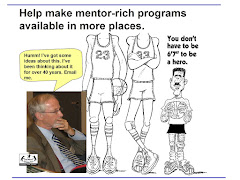This image is from a small collection of my library in my office on the North side of Chicago. Between 1993 and 1999 the Tutor/Mentor Connection was hosted at the Montgomery Ward Corporate Headquarters in Chicago and we had lots of space. Thus, we had a huge collection of publications and information files about Chicago area tutor/mentor programs. I also maintained a media clip file, of stories from local media.
However, we all know that once an article is printed, it's out of date. Thus, since 1998 I've been building a much larger library on the Internet than the one in my office. I host it on the Tutor/Mentor Institute, LLC web site and I point to ideas from all over the world. Because I point to the web sites hosting those ideas, people looking at these ideas are also exposed to the web libraries hosted by others. It's a vast network of knowledge available to everyone.
This map is an outline of just one section, where I post research articles and publications related to the challenges facing youth living in high poverty neighborhoods.
The purpose of this library is to support innovation and constant improvement. If program leaders, volunteers and donors can look at what people do in one place that seems to be working, they can expand the range of ideas they have to improve what they do in their own location...as long as they have the talent and resources to apply those ideas.
I created this illustrated essay to show how this information could be used by many to influence actions of others.
Using Ideas to Stimulate Competition and Process Improvement - Concept Paper by Daniel F. Bassill
I was contacted yesterday by a program leader looking for articles mentors could read that are related to some of the high profile media stories, such racial profiling and police shootings, domestic abuse, child abuse, etc. I was preparing an email response, and thought I'd just share that response here with more of you.
The Tutor/Mentor Connection web library has sub sections, and within these are sub-sub sections. One section titled homework help, has many ideas volunteers might look at for engaging their students. In this section there's also one focused on Black History, with links to some sites that could be used to develop discussion and activities.
Another section has the title of Law, Justice, Housing, Poverty and Prevention. Each of the sub sections have links to web sites that volunteers can visit to expand their thinking on issues affecting the youth they work with.
Another section focuses on research, which is also divided into sub categories focused on education, dropout prevention, social capital, mentoring and tutoring. The links I point to usually point to even more links.
I suggest that one activity any tutor/mentor program could undertake is to encourage a small group of youth and volunteers to go through the site, doing a deeper dive into the information. As they do this, they can create presentations that share sites they find valuable with the other youth, volunteers and staff in the organization...or with the larger community. I've been encouraging interns working with me to do this. This is an animation I made to introduce this concept.
New Assignment. A Quest. by tutormentor1 on GoAnimate
Video Maker - Powered by GoAnimate.
I've had interns from different colleges going through my web sites and library to create guides for users. Here's a video showing an animation created in 2009. Some of the links may be broken in this, but it illustrates work that can be done.
My library has been built over 40 years, starting with hard copy information, then moving to the internet in 1998. It was created primarily as my own "book shelf", providing ideas I could use to innovate better ways to recruit youth and volunteers, keep them connected, and have an impact on both groups. I've constantly borrowed ideas from others, and one complete section of the web library focuses on collaboration, innovation, knowledge management, etc. These are ideas that not only apply to tutoring/mentoring, but can be applied to many work/life situations.
Since I operated as a non profit from 1990-2011, one section is focused on philanthropy, and shows challenges that need to be overcome if high quality, long-term youth programs are to be in more places, reaching more youth.
I'm constantly adding to the library, and links often break. If you identify a broken link, send me a note. If you are building your own web library, with information that relates to my library, send me a link and I'll add it. I don't need to gather all knowledge in my library. I only need to point to knowledge that represents "all we need to know" to help well-organized non-school programs connect with youth in high poverty areas, and stay connected as those youth grow up and become adults.
If you're a university and want to co-host this library, or set up a curriculum to teach students and alumni to navigate the library, and use the information in their own actions, please connect. If you're one of the people featured in the philanthropy summit issues of Forbes, and want to put your name on this library and use if for your own purposes, I'd love to hear from you.









No comments:
Post a Comment